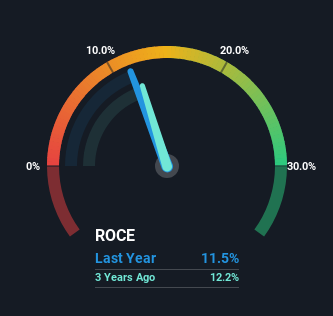- United States
- /
- Transportation
- /
- NYSE:NSC
Norfolk Southern (NYSE:NSC) Hasn't Managed To Accelerate Its Returns

If we want to find a stock that could multiply over the long term, what are the underlying trends we should look for? In a perfect world, we'd like to see a company investing more capital into its business and ideally the returns earned from that capital are also increasing. If you see this, it typically means it's a company with a great business model and plenty of profitable reinvestment opportunities. However, after briefly looking over the numbers, we don't think Norfolk Southern (NYSE:NSC) has the makings of a multi-bagger going forward, but let's have a look at why that may be.
Understanding Return On Capital Employed (ROCE)
Just to clarify if you're unsure, ROCE is a metric for evaluating how much pre-tax income (in percentage terms) a company earns on the capital invested in its business. Analysts use this formula to calculate it for Norfolk Southern:
Return on Capital Employed = Earnings Before Interest and Tax (EBIT) ÷ (Total Assets - Current Liabilities)
0.11 = US$4.5b ÷ (US$43b - US$3.7b) (Based on the trailing twelve months to September 2024).
Thus, Norfolk Southern has an ROCE of 11%. In absolute terms, that's a satisfactory return, but compared to the Transportation industry average of 7.6% it's much better.
See our latest analysis for Norfolk Southern

Above you can see how the current ROCE for Norfolk Southern compares to its prior returns on capital, but there's only so much you can tell from the past. If you'd like, you can check out the forecasts from the analysts covering Norfolk Southern for free.
So How Is Norfolk Southern's ROCE Trending?
Over the past five years, Norfolk Southern's ROCE and capital employed have both remained mostly flat. It's not uncommon to see this when looking at a mature and stable business that isn't re-investing its earnings because it has likely passed that phase of the business cycle. So unless we see a substantial change at Norfolk Southern in terms of ROCE and additional investments being made, we wouldn't hold our breath on it being a multi-bagger. This probably explains why Norfolk Southern is paying out 39% of its income to shareholders in the form of dividends. Unless businesses have highly compelling growth opportunities, they'll typically return some money to shareholders.
The Key Takeaway
In a nutshell, Norfolk Southern has been trudging along with the same returns from the same amount of capital over the last five years. Unsurprisingly, the stock has only gained 34% over the last five years, which potentially indicates that investors are accounting for this going forward. As a result, if you're hunting for a multi-bagger, we think you'd have more luck elsewhere.
One more thing, we've spotted 2 warning signs facing Norfolk Southern that you might find interesting.
While Norfolk Southern isn't earning the highest return, check out this free list of companies that are earning high returns on equity with solid balance sheets.
Valuation is complex, but we're here to simplify it.
Discover if Norfolk Southern might be undervalued or overvalued with our detailed analysis, featuring fair value estimates, potential risks, dividends, insider trades, and its financial condition.
Access Free AnalysisHave feedback on this article? Concerned about the content? Get in touch with us directly. Alternatively, email editorial-team (at) simplywallst.com.
This article by Simply Wall St is general in nature. We provide commentary based on historical data and analyst forecasts only using an unbiased methodology and our articles are not intended to be financial advice. It does not constitute a recommendation to buy or sell any stock, and does not take account of your objectives, or your financial situation. We aim to bring you long-term focused analysis driven by fundamental data. Note that our analysis may not factor in the latest price-sensitive company announcements or qualitative material. Simply Wall St has no position in any stocks mentioned.
About NYSE:NSC
Norfolk Southern
Engages in the rail transportation of raw materials, intermediate products, and finished goods in the United States.
Solid track record established dividend payer.
Similar Companies
Market Insights
Community Narratives



